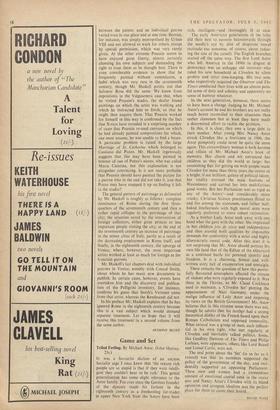Game and Set
IT was a favourite dictum of an ancient Socialist sage 1 once knew that 'the reason rich people are so stupid is that if they were intelli- gent they couldn't bear to be rich.' This genial generalisation has some slight relevance to the Astor family. For ever since the German founder of the dynasty made his fortune in the eighteenth century as a freebooting fur-trader in upper New York State the Astors have been
rich, intelligent—and thoroughly ill at ease.
The early American generations of the tribe did their best to squeeze heavenwards through the needle's eye by dint of desperate moral rectitude (no nonsense, of course, about reduc- ing the size of the camel). The English branches started off the same way. The first Lord Astor who left America in the 1890s in disgust at democracy was an unhappy old introvert who ruled his new household at Cliveden by silent probity and strict time-keeping. His two sons who respectively acquired the Observer and The Times conducted their lives with an almost pain- ful sense of duty and sobriety and apparently no sense of humour whatever.
In the next generation, however, there seems to have been a change. Judging by Mr. Michael Astor's account he and his brothers are not really much better reconciled to their situations than earlier clansmen but at least they have made a determined effort to tackle the problem.
In this, it is clear, they owe a large debt to their mother. After young Mrs. Nancy Astor struck Cliveden like a hurricane in 1906, the Astor pomposity could never be quite the same again. This extraordinary woman is both heroine and villain of Mr. Michael Astor's book of memoirs. Her charm and wit entranced her children as they did the world at large; her astonishing flair for getting on with people made Cliveden for more than thirty years the centre of a bright, if not brilliant, galaxy of political talent; her vitality stormed the male bastions of Westminster and carried her into multifarious good works. But her Puritanism was as rigid as any of the Astors'—and considerably more cranky. Christian Science practitioners flitted to and fro among the statesmen, and -rather half- baked intellectuals with high moral aims were regularly preferred to more robust rationalists.
As a mother Lady Astor took away with one hand what she gave with the other. She implanted in her children joie de vivre and independence and then stunted both qualities by impossible demands for conformity with a strict and highly idiosyncratic moral code. After this start it is not surprising that Mr. Astor should portray his own life (and that of the Editor of the Observer) as a continual battle for personal identity and freedom. It is a charming, honest and well- written story full of exasperation and nostalgia. There remains the question of how this power- fully flavoured atmosphere affected the stream of visitors who were regularly exposed to it. Was there in the Thirties, as Mr. Claud Cockburn used to maintain, a 'Cliveden Set' plotting the appeasement of Nazi Germany under the malign influence of Lady Astor and imposing its views on the British Government? Mr. Astor believes that in this extreme sense there was not, though he admits that his mother had a strong theoretical dislike of the French based upon their Roman Catholicism and supposed immorality. What existed was a group of men, each influen- tial in his own right, who met regularly at Cliveden and inevitably talked politics. Some, like Geoffrey Dawson of The Times and Philip ,1 Lothian, were appeasers; others, like Lord Brand lo and Lionel Curtis, were not.
The real point about the 'Set' (in so far as it existed) was that its members supported the policy of the government of the day, and inci- dentally supported an appeasing Parliament. , These men and women had a tremendous amount of emotional capital sunk in the status quo and Nancy Astor's Cliveden with its bland optimism and arrogant idealism was the perfect place for them to count their hoard.
DAVID WATT






































 Previous page
Previous page